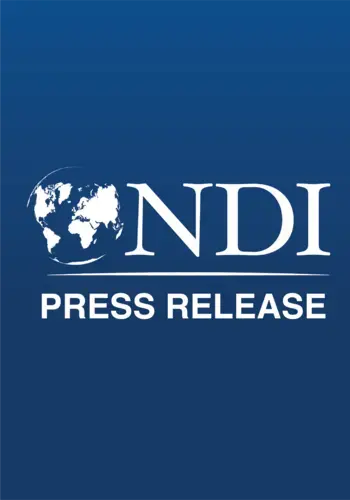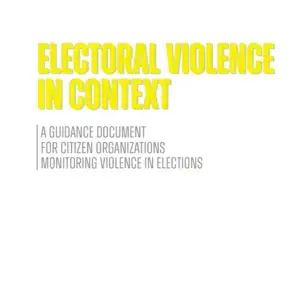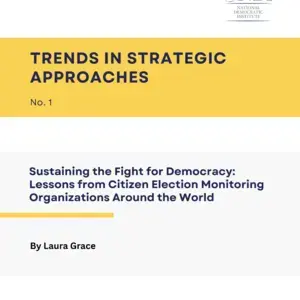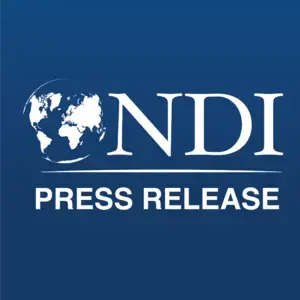TUNIS, Tunisia – A pre-election assessment mission organized by the National Democratic Institute (NDI) and the International Republican Institute (IRI) reported here today that the country appears to be on a decidedly democratic path since the beginning of its political transition in 2011. But to maintain public confidence, it must ensure parliamentary and presidential elections this fall are free of undue partisan interference and manipulation, the delegation said.
“The 2014 elections represent a milestone in the consolidation of Tunisia’s democratic transition,” according to the delegation. “The degree to which Tunisia’s citizens view these elections as credible turns largely on the extent to which the electoral process is administered in a professional manner, able to stand up to perceptions of political pressure, and made transparent through active and nonpartisan election observation.”
“This opportunity can be lost if partisan misconduct undermines the process, which would in turn shake public confidence in the integrity of the elections and reduce public trust in the country’s political institutions,” the delegation said.
The NDI and IRI delegation was part of a comprehensive mission to observe Tunisia’s elections. The mission was led by Isabelle Durant of Belgium, former vice president of the European Parliament; Robin Carnahan, former secretary of state of the U.S. state of Missouri; and Brad Smith, director of the Annenberg-Dreier Commission and former advisor to several members of the U.S. Congress.
From Sept. 9 to 12, the delegation held meetings in Tunis with candidates and parties from across the political spectrum; members of the Independent High Authority for Elections (ISIE) and the Independent High Authority for Audiovisual Communication (HAICA); domestic observer groups; members of parliament; the international and diplomatic communities; and women and youth civic groups. The delegation conducted its activities in accordance with the laws of Tunisia and international standards outlined in the Declaration of Principles for International Election Observation.
In its report, the delegation offered a number of recommendations for improving the electoral process, some of which, it said, could be undertaken in advance of the elections. They included:
For Election Administration
- ISIE should work to provide timely and consistent public access to election information. This should include:
- Posting minutes about its proceedings on the ISIE website
- Televising its proceedings and inviting observers to attend proceedings
- Clarifying questions for political parties on the use of campaign money
- Providing clear guidance on voting, counting and other procedures
- Providing observers full access to all proceedings.
- The HAICA should aggressively enforce laws and regulations relating to media coverage and investigate violations in a timely manner.
- Tunisians should feel safe when participating in elections. Special steps should be taken to minimize intimidation and fear.
For the Political Environment
- To address issues Tunisians care about, parties should engage in debates and dialogues focused on policy issues.
- Parties should commit to abiding by campaign finance regulations and investigate violations. Over time, rigorous limits on campaign contributions and expenditures should be developed.
- Civil society groups should track misuse of public resources.
- Political parties should outline clear platforms and refrain from speech and conduct that denigrates public confidence in the process.
- There should be no vote buying.
For Civil Society and the Media
- Civil society groups should encourage the construction of party agendas relevant to women and advocate for their adoption by political parties.
- Civil society groups focused on youth should find ways to motivate and engage young people to participate in the democratic process, with particular attention to voting.
- Tunisian observer groups should ensure that all observers are properly trained, should coordinate to ensure the broadest possible coverage of polling stations, and should document and publish their findings and recommendations, including a final report after the national elections.
- The HAICA and ISIE should uphold freedom of the media and investigate alleged restrictions in a timely manner.
- Media should take concrete steps to avoid any perception of political bias in their coverage and programming.
The National Democratic Institute is a nonprofit, nonpartisan, nongovernmental organization working to support and strengthen democratic institutions worldwide through citizen participation, openness and accountability in government. More information is available at www.ndi.org.
A nonprofit, nonpartisan organization, the International Republican Institute advances freedom and democracy worldwide by helping political parties to become more issue-based and responsive, assisting citizens to participate in government planning, and working to increase the role of marginalized groups in the political process – including women and youth.
###




